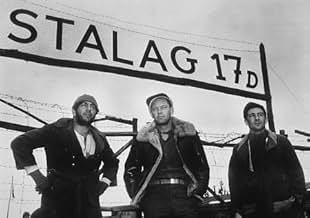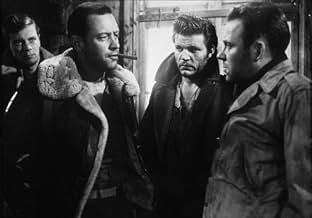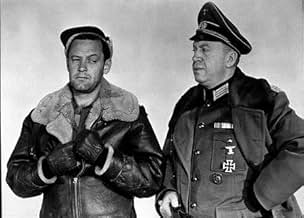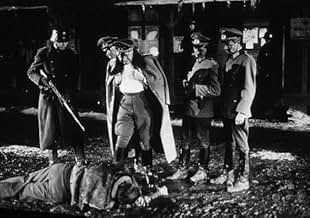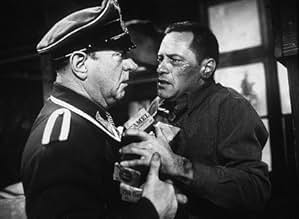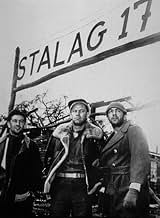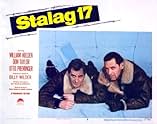Stalag 17
NOTE IMDb
7,9/10
60 k
MA NOTE
Pendant la Seconde Guerre mondiale, lorsque deux prisonniers américains sont tués après s'être évadés d'un camp de prisonniers allemands, J.J. Sefton, trafiquant de marché noir, est soupçonn... Tout lirePendant la Seconde Guerre mondiale, lorsque deux prisonniers américains sont tués après s'être évadés d'un camp de prisonniers allemands, J.J. Sefton, trafiquant de marché noir, est soupçonné d'être un informateur.Pendant la Seconde Guerre mondiale, lorsque deux prisonniers américains sont tués après s'être évadés d'un camp de prisonniers allemands, J.J. Sefton, trafiquant de marché noir, est soupçonné d'être un informateur.
- Réalisation
- Scénario
- Casting principal
- Récompensé par 1 Oscar
- 2 victoires et 8 nominations au total
Gil Stratton
- Sgt. Clarence Harvey 'Cookie' Cook
- (as Gil Stratton Jr.)
Avis à la une
William Holden is always in the shadows in `Stalag 17', he's always behind the characters or off to the side of the camera. You see, despite Holden's character Sgt. J.J. Sefton being the film's main character, he is only seen through the eyes of his fellow POWs, rarely ever alone. When they start to think he's the spy so do we. Oh, sure, we know he isn't the rat (movies don't do things like that), but since the story is told by all of the POWs who think Sefton is the rat, we start to think like them too. That is the mastery of Billy Wilder's `Stalag 17', it takes the film's most interesting character and sets him apart from the rest for most of the film, letting us learn about him as the characters do.
The story focuses on a group of POWs living in the American section of Stalag 17, supposedly the 's best POW camp. Among them are barracks chief Hoffy (Richard Erdman), Price (Peter Graves), Shapiro (Harvey Lembeck) and Animal Casava (Robert Strauss). They all have their own special job when their fellow prisoners try to escape, Price, for instance, is security'. The film starts when two prisoners try to escape the barracks. Everyone inside is enthused, thinking the two will make it very far, except Sefton, who bets precious cigarettes that they wont make it past the outer forest. When he turns out to be right the POWs start thinking there's a rat and that rat is Sefton. And as the first hour passes we think so too, it's only logical, Sefton has any luxuries because of his deals with the s.
The POWs start to bully Sefton, and once they beat him to a pulp he decides to discover who the real rat is (at this point, of course, we know he is ). His investigation isn't handled with dialogue though, we get this by seeing his facial expressions and his lurking in the shadows of the barracks.
So, what starts as a light, `gung-ho' type war movie (there's lots of comedy in the first hour) turns into a dark, sort of gritty thriller with a twist that left me with my mouth open. I wont reveal it, but I'll just say that Sefton smartly solves the mystery and redeems himself to the rest of the barracks (I didn't spoil anything, come on, it's expected).
As I said, there's lots of comedy in the first hour and some in the second, mostly from Strauss and Lembeck's characters. Some of the comedy is key in showing how these characters cope with their nearly hopeless situation, handled well by Wilder and the actors (Strauss' performance even gained him an Oscar nomination) but some of it just seems tacked on and out of place, like when a drunken Strauss thinks that Lembeck is a hell.
But that is a small qualm, and the rest of the film is excellent. The direction and writing are great in showing us a war film, a mystery, a thriller and a dark comedy all at once. I'd have to say I like the acting the most though, Holden (who won a leading Oscar for his work in this) is suave and charming, as well as mischievous and cynical, he creates a real `cool' character without trying too. And the rest of the cast - Graves, Otto Preminger - are admirable as well. The POWs aren't clichés or caricatures, they're all their own separate people.
`Stalag 17' is great as a war movie, a mystery, a thriller and a dark comedy. It's a classic film, for all who appreciate good cinema, 8.5/10.
The story focuses on a group of POWs living in the American section of Stalag 17, supposedly the 's best POW camp. Among them are barracks chief Hoffy (Richard Erdman), Price (Peter Graves), Shapiro (Harvey Lembeck) and Animal Casava (Robert Strauss). They all have their own special job when their fellow prisoners try to escape, Price, for instance, is security'. The film starts when two prisoners try to escape the barracks. Everyone inside is enthused, thinking the two will make it very far, except Sefton, who bets precious cigarettes that they wont make it past the outer forest. When he turns out to be right the POWs start thinking there's a rat and that rat is Sefton. And as the first hour passes we think so too, it's only logical, Sefton has any luxuries because of his deals with the s.
The POWs start to bully Sefton, and once they beat him to a pulp he decides to discover who the real rat is (at this point, of course, we know he is ). His investigation isn't handled with dialogue though, we get this by seeing his facial expressions and his lurking in the shadows of the barracks.
So, what starts as a light, `gung-ho' type war movie (there's lots of comedy in the first hour) turns into a dark, sort of gritty thriller with a twist that left me with my mouth open. I wont reveal it, but I'll just say that Sefton smartly solves the mystery and redeems himself to the rest of the barracks (I didn't spoil anything, come on, it's expected).
As I said, there's lots of comedy in the first hour and some in the second, mostly from Strauss and Lembeck's characters. Some of the comedy is key in showing how these characters cope with their nearly hopeless situation, handled well by Wilder and the actors (Strauss' performance even gained him an Oscar nomination) but some of it just seems tacked on and out of place, like when a drunken Strauss thinks that Lembeck is a hell.
But that is a small qualm, and the rest of the film is excellent. The direction and writing are great in showing us a war film, a mystery, a thriller and a dark comedy all at once. I'd have to say I like the acting the most though, Holden (who won a leading Oscar for his work in this) is suave and charming, as well as mischievous and cynical, he creates a real `cool' character without trying too. And the rest of the cast - Graves, Otto Preminger - are admirable as well. The POWs aren't clichés or caricatures, they're all their own separate people.
`Stalag 17' is great as a war movie, a mystery, a thriller and a dark comedy. It's a classic film, for all who appreciate good cinema, 8.5/10.
Although the film has several comedy scenes, I believe that the focus of the film is not that, the story is very believable, it deals with espionage, anger, doubt, revolt, envy among other feelings. Approaching such a serious topic, comedy comes to alleviate the tensions experienced by the characters. A great movie, I think it ended up revealing its secret too soon.
A classic without a shadow of a doubt, showing in a relaxed way life in a camp of pioneers approaching aspects that may have happened in a certain way. Actors fluent in English and German is a great differential for the film as it further enriches the narrative.
A classic without a shadow of a doubt, showing in a relaxed way life in a camp of pioneers approaching aspects that may have happened in a certain way. Actors fluent in English and German is a great differential for the film as it further enriches the narrative.
Director Billy Wilder was certainly no stranger to the horrors of World War Two. He was born in Austria-Hungary {now Poland} in 1906, but moved to Berlin to begin a career in movies. However, following the rise of Adolf Hitler, Wilder being Jewish fled for Paris and then the United States. His mother, grandmother and stepfather died at the Auschwitz concentration camp. As such, I think it'd be safe to presume that Wilder housed a considerable hatred towards Nazis, which makes his POW-picture, 'Stalag 17 (1953),' all the more remarkable. Whereas the film might have developed into a bleak, depressing drama, the screenplay by Wilder and Edwin Blum {adapted from a play by Donald Bevan and Edmund Trzcinski} effortlessly blends drama and comedy, clearing the path for other similarly-themed war-time films {David Lean's 'The Bridge on the River Kwai (1957)' and John Sturges' 'The Great Escape (1963)'} and even TV series {'Hogan's Heroes (1965-1971)' clearly used Wilder's film as a template including an identical Sgt. Schulz despite a failed court case in which producers sued for infringement}.
The year is 1944, in the week before Christmas. Stalag 17, a Nazi prisoner-of-war camp, is situated somewhere along the Danube River, and hundreds of captured Allied sergeants have been imprisoned there. The Americans of Barrack 4 endure a dull, deprived lifestyle, with each day consisting of unwholesome meals, tedious labour and uncomfortable living conditions. Displaying that typical American cleverness and resourcefulness, many of the prisoners have banded together to ensure themselves a few added luxuries such a makeshift radio to listen to the latest war news and to build an effective escape tunnel beneath the camp. However, it soon becomes apparent that there is a Nazi spy within their midst. After two escaping prisoners are immediately shot down, and their escape passage is inexplicably discovered, the men turn their suspicions towards J.J. Sefton (William Holden), a selfish and arrogant prisoner with a dog-eat-dog mentality that sees him openly bribing the German guards for luxuries. An unsympathetic character, one who nonetheless exhibits a certain streak of integrity, Sefton decides to uncover the true traitor of Barrack 4.
Though he was reluctant to play such an unlikable character, Holden won the Best Actor Oscar for his powerful performance {via the second-shortest acceptance speech in Academy Awards history a simple "thank you"}. The other actors in the film also create distinct and likable personalities, and I particularly enjoyed the big, oafish Animal (Robert Strauss) and Shapiro (Harvey Lembeck). Goodness knows what compelled the writers to make Sgt. Schulz (Sig Ruman), a loathsome tyrant in any other film, a jolly and hearty buffoon, but it works absolutely perfectly, his character's incompetence best highlighted in the sequence where he is distracted into playing volleyball, and enjoys the game so much that he hands his loaded weapon to the nearest POW. As Sefton attempts to uncover which fellow prisoner is leaving secret messages for their Nazis captors, Wilder intersperses the drama with an episodic flow of comedic situations, placing particularly emphasis on the means by which prisoners will alleviate their desire for the opposite sex. A hilarious sequence sees the drunken Animal mistaking his dressed-up bunk-mate for the cinema beauty Betty Grable, of whom he has an undying obsession.
The year is 1944, in the week before Christmas. Stalag 17, a Nazi prisoner-of-war camp, is situated somewhere along the Danube River, and hundreds of captured Allied sergeants have been imprisoned there. The Americans of Barrack 4 endure a dull, deprived lifestyle, with each day consisting of unwholesome meals, tedious labour and uncomfortable living conditions. Displaying that typical American cleverness and resourcefulness, many of the prisoners have banded together to ensure themselves a few added luxuries such a makeshift radio to listen to the latest war news and to build an effective escape tunnel beneath the camp. However, it soon becomes apparent that there is a Nazi spy within their midst. After two escaping prisoners are immediately shot down, and their escape passage is inexplicably discovered, the men turn their suspicions towards J.J. Sefton (William Holden), a selfish and arrogant prisoner with a dog-eat-dog mentality that sees him openly bribing the German guards for luxuries. An unsympathetic character, one who nonetheless exhibits a certain streak of integrity, Sefton decides to uncover the true traitor of Barrack 4.
Though he was reluctant to play such an unlikable character, Holden won the Best Actor Oscar for his powerful performance {via the second-shortest acceptance speech in Academy Awards history a simple "thank you"}. The other actors in the film also create distinct and likable personalities, and I particularly enjoyed the big, oafish Animal (Robert Strauss) and Shapiro (Harvey Lembeck). Goodness knows what compelled the writers to make Sgt. Schulz (Sig Ruman), a loathsome tyrant in any other film, a jolly and hearty buffoon, but it works absolutely perfectly, his character's incompetence best highlighted in the sequence where he is distracted into playing volleyball, and enjoys the game so much that he hands his loaded weapon to the nearest POW. As Sefton attempts to uncover which fellow prisoner is leaving secret messages for their Nazis captors, Wilder intersperses the drama with an episodic flow of comedic situations, placing particularly emphasis on the means by which prisoners will alleviate their desire for the opposite sex. A hilarious sequence sees the drunken Animal mistaking his dressed-up bunk-mate for the cinema beauty Betty Grable, of whom he has an undying obsession.
In defense of this great film "Stalag 17", I would like to say a few things. First of all, William Holden's performance in this film gives this film a very big lead against many other films like it. Holden is a very good actor given a very good role here as Sefton, a soldier that uniquely accepts his situation. The other supporting, and even prominent roles are good but seems "intentionally" underdeveloped for the benefit of not complicating viewers with unnecessary information. The story, consisting of a "whodunit" plot, wartime ordeals, and amusing dialogue between the characters is superb for it's time. All in all, watching "Stalag 17" is at least a fine way to spend your time.
I've read many reviews that say that they were disappointed with this film. Some were annoyed because it wasn't as realistically gritty and tense like "Saving Private Ryan". Well, that's the effect of the Hays Offices (censorship officials of American produced movies during the past). I have to say that although it may have lacked the grittiness of Spielberg's film, it still surpasses "Saving Private Ryan" for it's honest approach to it's characters such as the POW that responds to his wife's letter ("I believe it.") with a certain kind of feeling that can truly be described as honest and the German "Wake up caller" Scherbach's constant joking around with POWs while remaining true to his kommandant's wishes. The 'Animal' and Shapiro characters were obviously created for comic relief but it should only be taken as that, comic relief (Hell, everyone's a comedian and at least they tried). Most anybody that was disappointed with this film were probably disappointed for it's strange association with the TV show "Hogan's Heroes". I must say that I don't care much for that certain show but I do like this film.
I really don't think that any film should ever be compared with another film or a TV show (unless it's a spinoff, then they're just asking for it) no matter how related they are. A movie is a movie on it's own and never with the help of another, no matter the similarities. This is a classic film, worthy of it's praise yet unworthy of it's negative critique. Nobody should let personal opinions be considered flaws. Just watch it, when you have the chance, with an open mind.
I've read many reviews that say that they were disappointed with this film. Some were annoyed because it wasn't as realistically gritty and tense like "Saving Private Ryan". Well, that's the effect of the Hays Offices (censorship officials of American produced movies during the past). I have to say that although it may have lacked the grittiness of Spielberg's film, it still surpasses "Saving Private Ryan" for it's honest approach to it's characters such as the POW that responds to his wife's letter ("I believe it.") with a certain kind of feeling that can truly be described as honest and the German "Wake up caller" Scherbach's constant joking around with POWs while remaining true to his kommandant's wishes. The 'Animal' and Shapiro characters were obviously created for comic relief but it should only be taken as that, comic relief (Hell, everyone's a comedian and at least they tried). Most anybody that was disappointed with this film were probably disappointed for it's strange association with the TV show "Hogan's Heroes". I must say that I don't care much for that certain show but I do like this film.
I really don't think that any film should ever be compared with another film or a TV show (unless it's a spinoff, then they're just asking for it) no matter how related they are. A movie is a movie on it's own and never with the help of another, no matter the similarities. This is a classic film, worthy of it's praise yet unworthy of it's negative critique. Nobody should let personal opinions be considered flaws. Just watch it, when you have the chance, with an open mind.
Stalag 17 (1953)
A far reaching precursor to the Stalag 13 of television's "Hogan's Heroes" and a bracing splash in the face for Americans grasping, still, the repercussions of WWII, "Stalag 17" was and is sharp, funny, and compact. On one simple level, it's enjoyable as a tightly made film, period. The acting, writing, editing, and photography--coordinated of course by now legendary director Billy Wilder--snaps like a whip, and two hours goes by fast. A host of minor actors pull of major performances, and the one really big name, William Holden, has the most unusual role, and he gives it an unfriendly edge that really helps save the movie.
Save the movie, that is, from a kind of frivolousness. It is, at its core, a really well made sitcom. The situation is a Nazi prison camp, not the kind of place we expect humor. And the comedy comes from making fun of the Nazis, who are always fair game. The reference to "Hogan's Heroes" is no joke, for those who have seen that 1960s series around the same situation (even including a comic Sgt. Schultz). The producers of "Stalag 17" sued the producers of "Hogan's Heroes" and won. But Stalag is not just a comic romp. There are shades of bitterness that reflect a real camp--almost the kind of gallows humor you need to survive a horrible situation. And there is also a serious strand about who you can trust, about finding the traitor on the inside, and about persecuting the wrong man.
Strictly a studio production, this falls just three years after Wilder's "Sunset Blvd"which uses Holden in another embittered role, and which makes fun of studio productions and Hollywood in general. Though based on a Broadway play, it rises above any sense of being set on a stage, and yet it really does not achieve any sense of realism. It's just short of a farce. The narration at the start announces that here, at last, we will have a movie not about the front and fighting, but about prisoners in a prison camp. It announces, that is, that it will be a different kind of WWII film.
And it is. Holden won best actor for his role. Otto Preminger, the great German director working in Hollywood (and bucking the censors there), plays the commandant of the prison. And Peter Graves is another prominent prisoner, a counterpart to Holden. The photography is by none other than the great Ernest Laszlo, and Franz Waxman heads up the music. It's no wonder it's a smart, sharp, snappy film. What it isn't, however, is deep or probing or moving. It's an entertainment, and a great one, but it keeps any larger expectations in check. And so should you.
A far reaching precursor to the Stalag 13 of television's "Hogan's Heroes" and a bracing splash in the face for Americans grasping, still, the repercussions of WWII, "Stalag 17" was and is sharp, funny, and compact. On one simple level, it's enjoyable as a tightly made film, period. The acting, writing, editing, and photography--coordinated of course by now legendary director Billy Wilder--snaps like a whip, and two hours goes by fast. A host of minor actors pull of major performances, and the one really big name, William Holden, has the most unusual role, and he gives it an unfriendly edge that really helps save the movie.
Save the movie, that is, from a kind of frivolousness. It is, at its core, a really well made sitcom. The situation is a Nazi prison camp, not the kind of place we expect humor. And the comedy comes from making fun of the Nazis, who are always fair game. The reference to "Hogan's Heroes" is no joke, for those who have seen that 1960s series around the same situation (even including a comic Sgt. Schultz). The producers of "Stalag 17" sued the producers of "Hogan's Heroes" and won. But Stalag is not just a comic romp. There are shades of bitterness that reflect a real camp--almost the kind of gallows humor you need to survive a horrible situation. And there is also a serious strand about who you can trust, about finding the traitor on the inside, and about persecuting the wrong man.
Strictly a studio production, this falls just three years after Wilder's "Sunset Blvd"which uses Holden in another embittered role, and which makes fun of studio productions and Hollywood in general. Though based on a Broadway play, it rises above any sense of being set on a stage, and yet it really does not achieve any sense of realism. It's just short of a farce. The narration at the start announces that here, at last, we will have a movie not about the front and fighting, but about prisoners in a prison camp. It announces, that is, that it will be a different kind of WWII film.
And it is. Holden won best actor for his role. Otto Preminger, the great German director working in Hollywood (and bucking the censors there), plays the commandant of the prison. And Peter Graves is another prominent prisoner, a counterpart to Holden. The photography is by none other than the great Ernest Laszlo, and Franz Waxman heads up the music. It's no wonder it's a smart, sharp, snappy film. What it isn't, however, is deep or probing or moving. It's an entertainment, and a great one, but it keeps any larger expectations in check. And so should you.
Le saviez-vous
- AnecdotesWilliam Holden never felt he deserved an Oscar for his performance in this film. His wife felt it was to compensate for him not winning for "Boulevard du Crépuscule (1950)."
- GaffesIt's December 1944. Every morning at 6:00 it's roll call for the prisoners of Stalag 17. Although in the middle of December, in southern Germany the sun will never rise before 8:00; the roll call in the movie is in full daylight.
- ConnexionsFeatured in Paramount Presents (1974)
- Bandes originalesWhen Johnny Comes Marching Home
(1863) (uncredited)
Written by Louis Lambert
Played during the opening credits
Played on a record and sung by the prisoners of war
Whistled a bit by Gil Stratton at the end
Meilleurs choix
Connectez-vous pour évaluer et suivre la liste de favoris afin de recevoir des recommandations personnalisées
Détails
- Date de sortie
- Pays d’origine
- Langues
- Aussi connu sous le nom de
- Infierno en la tierra
- Lieux de tournage
- Société de production
- Voir plus de crédits d'entreprise sur IMDbPro
Box-office
- Budget
- 1 661 530 $US (estimé)
- Durée2 heures
- Couleur
- Rapport de forme
- 1.37 : 1
Contribuer à cette page
Suggérer une modification ou ajouter du contenu manquant




